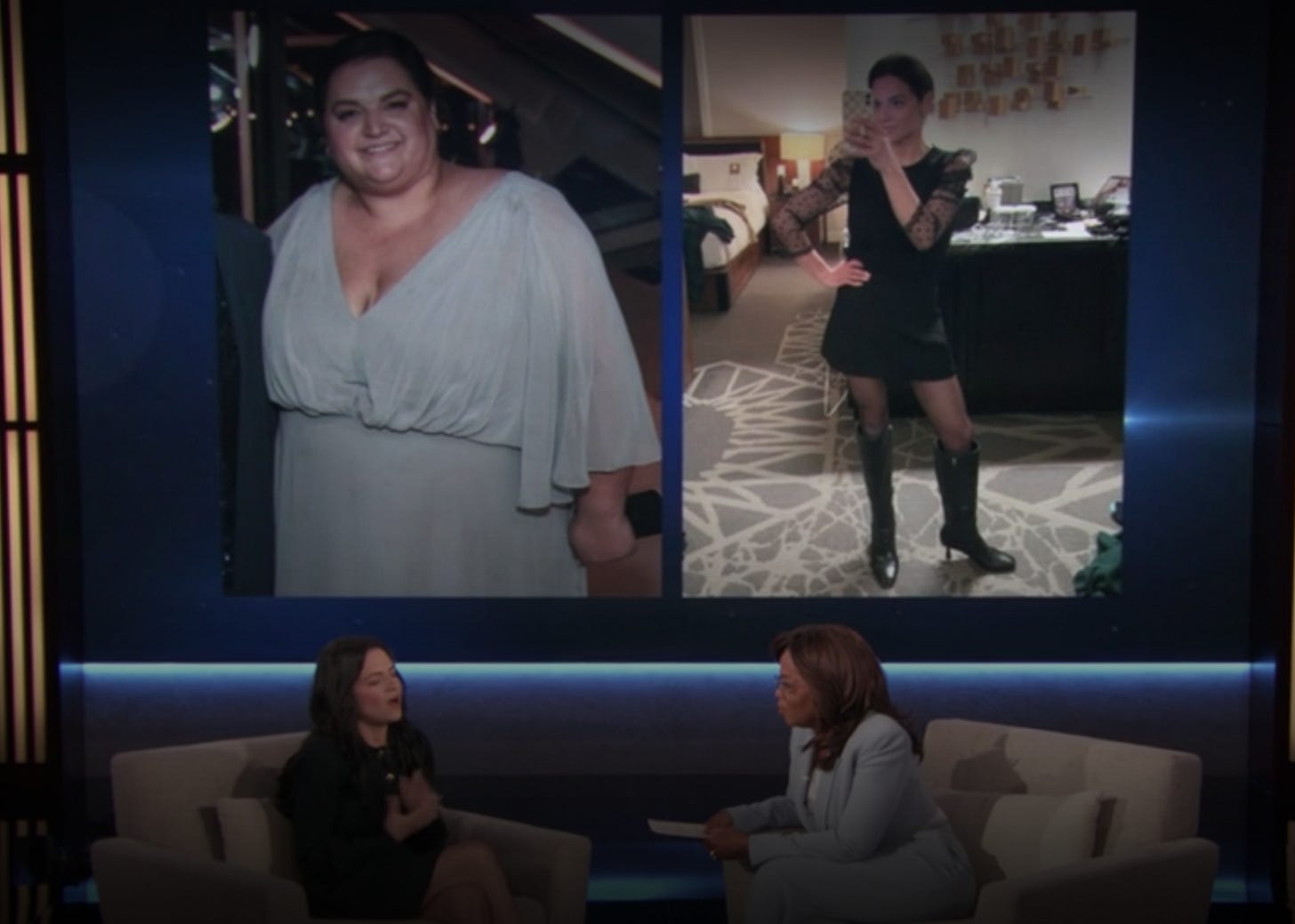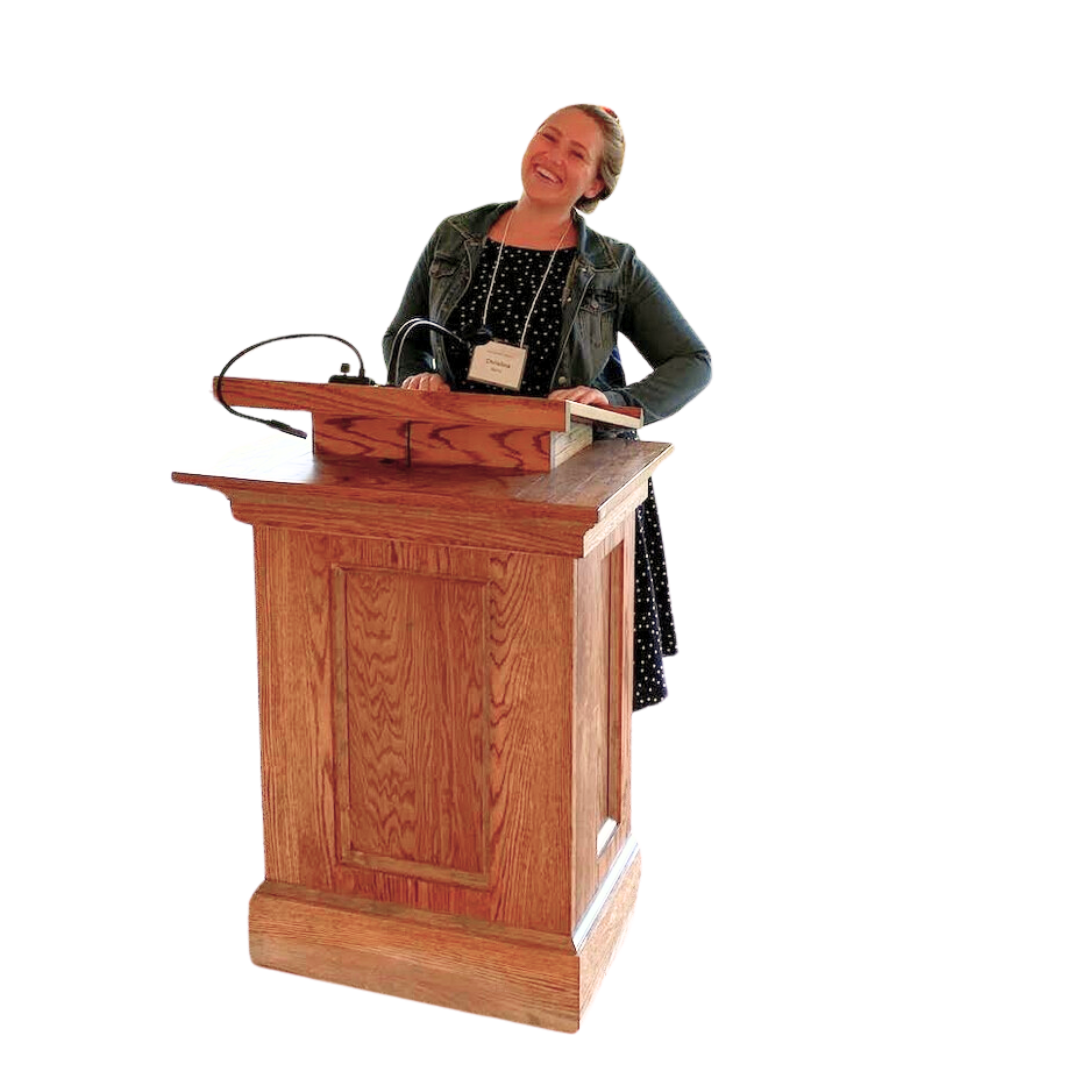I have some questions for you: Oprah's Ozempic Special
Thoughts on the multi-billionaire discussing her shame and "revolution"
What’s Inside:
3 Good Things
An essay on Oprah
1 writing prompt
Photo by Blake Meyer on Unsplash
3 Good Things
A little joy from my corner of the world.
Spring Equinox! Which means lots of us are coming out of our winter blues and that flowers are starting to bloom. 🌸
Body art class! For the past few weeks I’ve been taking an art class focused on body positivity. It’s been really insightful; more soon. 🎨
Santa Barbara! Recently I took a day trip to SB and found a cute little beach on the way that reminded me how calming nature is. 🌴
What are 3 good things going on in your life?
On Oprah
I wasn’t sure if I would watch the ABC/ Hulu special that Oprah filmed, “Shame, Blame, and the Weight Loss Revolution.” She’d already come out that she’s been using weight loss drugs, but won’t name the brand (we can guess it’s Ozempic). And lots of people criticized her choice for being forthcoming (yet so many public figures are denying use, simply claiming it’s because they are exercising more). Even the title of the show sounds like she’s solved the ‘problem’ of being fat.
But as someone who grew up watching Oprah’s talk show, and so much discourse now around the drug, I wanted to see what she had to say. So I started up a Hulu trial and settled in to watch the hour-long special.
The intro clip shows some people as huge fans of Ozempic while others have awful side effects. So I thought this might have a more balanced approach rather than a low key endorsement.
Then it cuts to Oprah in a studio with a live audience. She addresses the camera.
“I wanted to do this for the more than 100 million people in the USA and over 1 billion people in the world living with obesity,” Oprah says. “Maybe that’s you or someone you love… so I come to this conversation with hope.”
“We can start releasing the stigma, shame, judgement to stop shaming other people for being overweight or how they choose to lose or not lose weight; and to stop shaming ourselves.”
“I have to say that I took on the shame that the world gave to me. For 25 years, making fun of my weight was a national sport.” She reads a few awful headlines about her weight.
To combat this, for five months she “starved” herself. And then she shows that famous picture of her wheeling out the wagon of fat that represented how much weight she lost.
This episode aired in 1988 and seemed to live on for decades but I don’t recall her being candid about how she lost the weight before this special. I do remember many of her shows featured diet tips, weight loss experts who pushed supplements and meal plans that millions like me watched and bought into. It’s where all my time, attention, and money went, and as diets failed me, my shame bloomed, my confidence plummeted.
For her to admit she starved herself, that she took on this shame, is a powerful moment that says a lot about diet culture, about the desire to be thin, about the pressures to look a certain way. And I wish she pressed more on this.
The very next day, she says, she started to gain the weight back.
Oprah says many people relate to this, and it cuts to an intro of her first guest, Amy, who says her life “completely transformed” after she lost weight through weight loss medications.
In fifth grade, Amy says a kid said to her, “You’re the fat one.” It stayed with her. As she recalls this memory, she says she felt ashamed and alone. But what did she have? Food.
Soon she lost her father, eventually got married and had children, but didn’t want to take her kids outside anywhere because she felt so ashamed about her body.
“The inevitable happened,” Amy states. “I was diagnosed with diabetes.”
I want to pause here and state that not all people who are overweight are diabetic, and I think this idea that being fat “inevitably” leads to this is harmful because it perpetuates negative stereotypes. There are thin people who have diabetes (Halle Berry, Larry King, Salma Hayek, Nick Jonas, Jay Cutler, Sharon Stone, Tom Hanks are just a few examples).
Amy continues, “I avoided going to the doctor because I felt so much shame.” But she finally went, saying that the medication (Mounjaro) finally freed her from “food noise.”
Oprah is excited that this food noise is now gone for her too and she can now only eat “half a bagel!”
“What’s the difference between being in a smaller body versus a bigger body?” Oprah asks.
“I’m treated like a completely different human being,” Amy says. People are nicer to her, and by extension, even her children. In clothing stores, she can now go into any one, try on a pair of jeans, and it fits. Amy got emotional thinking about her former (fat) self and how she couldn’t have done that before.
For people who feel ashamed to go to the doctor because of how fat people are treated, why aren’t there more doctors who treat fat folks with dignity, who use the Health at Every Size approach? Why aren’t retailers more accessible for larger bodies? Why do we as a society treat fat folks so poorly? I was treated differently— better— when I was smaller.
For some people, they can go to the gym and eat the “right” things to maintain, or lose, weight. But it’s not the case for everyone. Oprah says the main difference is that she was obsessed about food— when was the next meal and what would it be and how many calories— while others don’t have those thoughts.
Why isn’t the idea of diet culture introduced; that food noise is the result of diet cycles, counting Points/ calories, restricting and obsessing? How did these thoughts even start? For me, food noise quieted once I started the journey to stop dieting and restricting.
“Obesity,” Oprah says into the camera, “is a disease.” She compares it to alcoholism— that years ago people didn’t see it as a disease, but eventually accepted it, which helped some people get help without the shame. She says that weight loss medication is “the answer we’ve been waiting for” though it’s not a miracle. It’s a tool that has to be used with other tools— hiking, strength training, eating a healthy diet— and one that people need to be on the rest of their life. At $1,000 per month, this isn’t accessible for everyone.
What if we started this earlier so people didn’t have to struggle their whole lives, Oprah wonders. After all, the American Academy of Pediatrics (AAP) recommends “obesity medications for people over 12 years old.” But there are plenty of critics who think putting children on weight loss drugs only perpetuates the issue and sets them up for disordered eating. Oprah doesn’t talk to them though. Her next guest is a mother who saw her daughter struggling with being teased because of her body. “She’s a good eater,” her family said, “but ate too much food for a child of her age.”
Maggie Ervie, the young girl whose mother took her to weight loss clinics, says, “I didn’t know what it was like to be full. I just kept eating.”
Her mom Erika had to shop for clothes for her in the adult section, or get them custom made. She tried everything to help her and much of the advice was what most people who want to lose weight hear: calories in, calories out; eat less. But nothing worked.
Maggie had bariatric surgery at 13. In recovery, the doctor said she also had to take medication, Victoza (like a pre-Ozempic), as the surgery didn’t give the expected results.
After lots of photos of the “before” fat kid, the camera cuts to footage of present-day Maggie, talking about going to prom, twirling in a dress while a voice over says, “Omg you’re so pretty!!!”
Oprah introduces the mother daughter duo on her stage after announcing how much weight Maggie’s lost and that she now has her driver’s license. (Oprah had read The Cut article about them and wanted them on her special.)
The benefits outweighed the risks for them. The risk of staying fat, Erika says, is diabetes. And one health practitioner told the mother that her daughter would “easily be 500 pounds by the time she turned 16 and that she will die.”
I cannot imagine hearing someone I love “will die” and not be compelled to cry or get angry. Scare tactics about how being fat will kill you seems to push the family into a corner.
Erika is also on weight loss medication, but states the other brand-names are out of reach financially. They will both have to be on them for the rest of their lives. But she is happy with their decision. “Maggie’ll have a healthy life now.”
As for the high school teen, she loves it too. “I feel more noticed,” Maggie says.
Between the surgery and the medication, I wonder how much a growing teen’s body and brain is impacted by this, as well as the impact of getting positive attention based only on her body and weight loss. And does Ozempic equal a healthy life automatically?
“What do you have to say to those who might be judging you for putting your daughter on this?” Oprah asks.
“Walk a mile in my shoes,” Erika says. The mom gets teary as she says, “How do I teach her to love herself and her body right now and has the desire to be in a different body?
This is the million dollar question that I’m not sure has an easy answer, and I wonder if my family had the resources if this could have been a route my mother explored in wanting to help her daughter get out of the pain of daily bullying. Would it have prevented me from dieting, or made it even worse? Would it have helped me love my body? Given me health complications?

Now in a groove, Oprah goes to another audience member taking Ozempic, Jewel, telling the audience this woman’s “before” weight. Jewel states how much she’s lost and how it’s “completely changed her life.” Her mother Marissa was reluctant at first for her daughter to go on it but is on board now because of the domino effect it’s had, stating her mindset is changing to go along with loving her smaller body.
“There is now a sense of hope, and you no longer blame yourself,” Oprah starts to get misty. “You think you’re smart enough to figure it out but then you learn you’re just fighting your brain.”
To “avoid a conflict of interest” in order to film this special, Oprah stepped down from Weight Watchers (WW). Prior to this, she was excitedly counting her Points and thought this was the key to lasting weight loss. She admits she had lost some weight while on WW… and also put on some weight. CEO of Weight Watchers Sima Sistani is in the audience and Oprah has her answer some questions about the controversial company.
“We are the most clinically tested science backed behavior change program,” Sistani says. They were just missing the third prong, the biology of it all, she explains. “We need to provide that care and release the shame. It’s not your fault,” she says.
Katie Sturino, founder of MegaBabe and author of Body Acceptance for Everyone, in a post on Instagram said that line— it’s not your fault— is soclose to an apology and she feels we are all owed this. Sistani saw this and posted a video response apologizing. WW has changed its philosophy since the 2 years she’s been there, she says, and offers weight loss medications to help. In an interview with Fortune, Sistani says she sees these medications as “the end of diet culture.” But isn’t this idea still going against accepting our bodies and not seeing them as problems to fix?
“Why do we need WW now?” Oprah asks Sistani.
“It’s not just about weight loss but community and education and care. That’s our new philosophy— longer, happier lives.”
What happens when people stop taking the medication? Can people live long, happy lives without this medication… staying fat? It’s implied that this isn’t possible. If Oprah had a more balanced approach, she could have invited fat activists to give their perpective.
To her credit, Oprah asks about long term side effects of drugs like Ozempic. Dr. Jennifer Ashton, chief correspondent for ABC News says, “These drugs were approved 20 years ago and there’s plenty of research.”
There’s only 4 questions Dr. Jen recommends you ask yourself: What’s the risk of taking the medicine? Versus not taking? What are the benefits of taking these drugs? What are the benefits of not taking these drugs?
Dr. Jen then looks directly into the camera. “We know conclusively that if you do not handle the conditions of overweight or obesity, the risks are significant like heart attack, stroke, cancer.”
The risks of the medication are “only 1 out of every 100,000” and only 17% stopped taking it due to side effects. “This isn’t a character flaw, but a disease and should be managed accordingly,” she says.
An audience member, Rolanda, is asked about her experience with Ozempic after her doctor prescribed it for weight loss. She stopped taking it after 4 months after a horrible time, including a trip to the ER in which she threw up blood.
Oprah asks the experts, Dr. W. Scott Butch of the Cleveland Clinic in Ohio and Dr. Amanda Velasquez of Cedars Sinai in Los Angeles, if this is common.
“It’s about education and effective management of the side effects,” Dr. Velasquez says. “They’ve gotten over hyped. They are mild to moderate. There’s been a lot of hype around, like, pancreatitis, gallbladder complications, thyroid cancer… It hasn’t been shown in human studies. The risk is less than 1%. It’s rare,” she says, “we just have to screen for those who have those conditions.”
Asked if she’d consider another weight loss medication brand, Rolanda said she’d think about it.
To wrap up, Oprah addresses the camera once more. “For people who feel happy and healthy and celebrating life in bigger bodies, I say bless you. For those that think diet and exercise is the key, bless you too. For those who think this could be the relief, freedom and support, bless you. There is space for all points of view.”
So of course the internet has been going wild and there *are* all points of view. Oprah, like many women in the public eye, has endured harsh scrutiny around her body. For months I’ve seen the reddit threads on this and stories on TikTok and also in fat communities about the new weight loss drug. Some people are happy being fat; others talk about the risk of malnutrition, cancer and thyroid issues; relief from dieting; the 90s ‘miracle weight loss drug’ Fen-Phen; big pharma profiting for life on people who want to be thin above all else; Oprah’s massive influence. I’m still thinking through this all.
Prompt: Write about your impressions of public figures and their bodies. This can be someone like Oprah, or celebrities you’ve seen on the cover of magazines and conversations around their weight (gain/loss). How has this impacted your view of them? Of yourself?
💕 Thanks for reading Such a Pretty Face! If you found this useful, like, restack, comment, share, or subscribe. Have a question, topic, or concern? Want to say hi? Reply to this post. Merci! Gracias! Danke! 💕
Christina Berke is a Los Angeles based writer working on WELL, BODY, a memoir about eating disorders, body image, and childhood trauma. An excerpt of this was Longlisted with Disquiet Literary International. A former Managing Editor for Black Mountain Institute’s award-winning literary magazine, Witness, she currently reads for Split Lip. Find out more at www.christinaberke.com. Sign up for there for a quarterly newsletter filled with writing prompts and course offerings.











